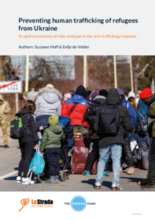Displaying 1801 - 1810 of 14574
Poziționarea Copiilor și a Tinerilor în Centrul Reformei Sistemului de Îngrijire este un manual introductiv destinat practicienilor. Manualul oferă o imagine de ansamblu extensivă asupra modului de implicare semnificativă a copiilor și a tinerilor în reforma sistemului de îngrijire. Acesta acoperă cadrul juridic și teoretic, elementele de bază pentru implicarea copiilor și a tinerii cu experiență trăită în mod incluziv și modalități practice de antrenare a copiilor și a tinerilor în monitorizare și evaluare. De asemenea, are un capitol amplu despre modul în care copiii și tinerii pot și ar trebui să fie implicați pe întreg parcursul reformei sistemului de îngrijire, de la luarea deciziilor cu privire la propria lor îngrijire, până la implicarea în deciziile de politică globală. Manualul va provoca cititorii să sporească implicarea copiilor și a tinerilor cu experiență trăită în munca lor și îi va dota cu instrumentele necesare pentru a realiza această implicare într-un mod sigur și semnificativ.
Childrearing in sub-Saharan Africa is often viewed as collaborative, where children benefit from support from kin. For single mothers living in informal settlements, kin networks may be highly dispersed and offer little day-to-day childrearing support, but may provide opportunities for child fostering. This study conducted in Nairobi, Kenya, uses a linked lives approach, where single mothers’ connections with kin and romantic partners may influence whether – and what type of – kin are relied on to support child fostering.
This article discussed the proceedings for placement of children in foster care by foreign authorities introduced into Polish law. The available official data indicate that the British and German authorities are the most inclined to place children with Polish citizenship in foster care in their homeland.
A U.S. government investigation into the dark history of Native American boarding schools has found "marked or unmarked burial sites" at 53 of them, Interior Secretary Deb Haaland said on Wednesday.
The Eastern and Southern Africa Regional Learning Platform hosted a webinar on 11 May 2022 examining why it is important to align care systems in development and humanitarian contexts and provides practical examples from Kenya and Uganda.
Join us on the 11th of May from 11.00 - 12.30 Nairobi time to explore the importance of ensuring that care systems developed in humanitarian settings adhere to national standards and contribute to the development of national care systems. Examples from Uganda and Kenya will illustrate how care systems in refugee camps can be aligned with the national care system.
This report aims to provide a rapid assessment of the risks of trafficking and exploitation created by the war in Ukraine and the gaps in the current anti-trafficking response, in order to identify what needs to be done now to reduce and prevent trafficking before it is too late. This rapid assessment is based on desktop research; interviews/discussions with organisations, experts and participants in the anti-trafficking response including volunteers, translators, refugees, and displaced people; and a field visit to Poland.
The European Commission has proposed a “10-Point Plan for stronger European coordination on welcoming people fleeing the war from Ukraine” (endorsed by the European Parliament and the Council) that includes: creation of an EU platform for registration; an EU level coordinated approach for transport and information hubs; and a call to enhance reception systems and ensure continuity of care and suitable accommodation, among others.
- Job no: 550724
- Contract type: Consultancy
- Duty Station: Geneva
- Level: Consultancy
- Location: Switzerland
The purpose of this consultancy is to develop a ready-to-use, easy-to-contextualize workshop package, including PowerPoints, checklists and tip-sheets, case studies, and videos, to support the application of Pillar 4 in the Minimum Standards for Child Protection in Humanitarian Action: Standards to Work Across Sectors. Sectors of focus will include Education, Health, Food Security, Camp Coordination and Camp Management, and Nutrition.




